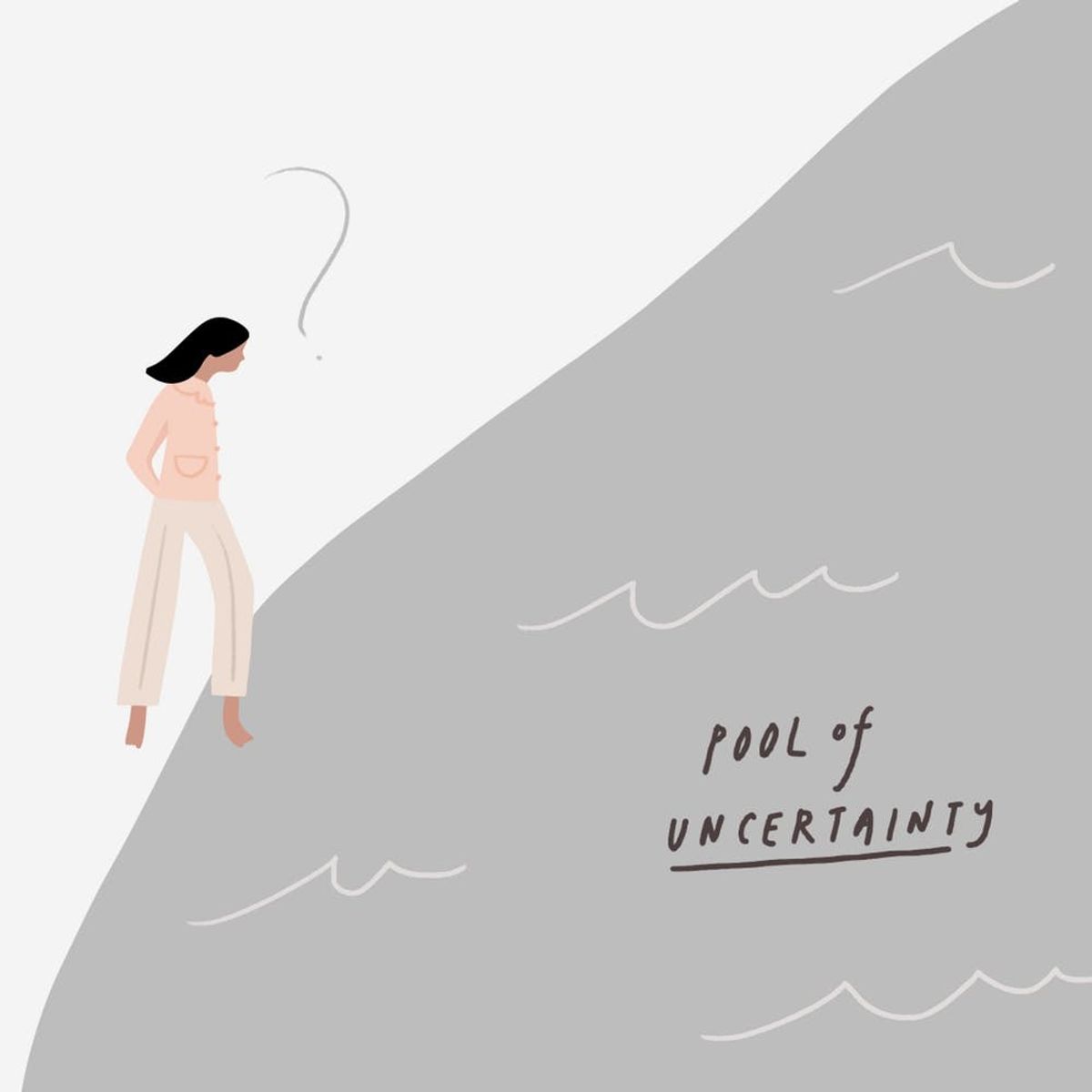I’m Not Sure If I Still Identify As Pro-Life

I’m not sure if I’d identify as “pro-life” anymore. Emphasis on “not sure.”
15 years ago, I picked up a free anti-abortion bumper sticker at a Christian music festival, the same event where I purchased a shrunken pink t-shirt that read, “Waiting for a nice Christian man.” Without a bumper to affix my sticker to, I slapped it on the front of the drawer where I stored my scrapbooking supplies.
“I bet the pro-choicers are glad their parents weren’t,” the sticker read. My assent to this adhesive agenda was uncomplicated by demographic statistics or the diverse stories of those seeking to terminate pregnancies.
While I cast my sticky note ballot for George W. Bush in the Thompson Middle School election, as an adult, I’ve only voted for pro-choice candidates. My political views first shifted left in college, not an uncommon phenomenon. After four years teaching in the south and west sides of Chicago, my qualms with the religious right only grew more visceral. I became disillusioned with the inconsistencies in the pro-life ethic and the disconnect between protesting abortion, but not addressing its causes.
Today, I identify as a pro-life Democrat. My beliefs align with many of the tenets of the political left. Among my non-Christian friends, I make sure to differentiate myself from the 75 percent of evangelical Protestants who voted Trump into office. By holding onto the pro-life label, I avoided “baby murder” accusations when conservative friends challenged my vote for Hillary. In turn, I also challenged them to expand their definition of a pro-life ethic to include other issues like the death penalty, systemic racism, gun control, and health care.
This summer, a friend posted writer Lindy West’s New York Times op-ed on her Facebook wall. Titled “Of Course Abortion Should Be a Litmus Test for Democrats,” the article threw stones at my hybrid political category. “Abortion is not controversial on the left,” West proclaimed. My stomach sank as I read these words, and I wondered why. It certainly was not the first instance I’d heard either side of the political spectrum upholding abortion as a political or religious litmus test for orthodoxy and/or party alignment.
Instead of getting riled up to defend my position, I started down the mental path I always do when faced with the abortion question, a dance of moral conviction and religion clashing against policy support and political theory. The article added to my growing sense that I use “pro-life Democrat” as an eloquent cover-up for my real stance on abortion: total confusion.

While partisan yes-or-no views typically rise to the surface in the public sphere, I’m not the only one who is unsure about abortion. In a 2015 Vox poll in partnership with PerryUndem research group, 18 percent of the 1,067 respondents identified as both pro-life and pro-choice. Another 21 percent identified as “neither.” I wanted to hear from these people: the ones who don’t know how to enter the conversation, who are wading into the gray area and finding our current vocabulary inadequate.
Corinne Van Arsdale, 30, has a complex relationship with the pro-life/pro-choice debate.She grew up in a religiously and politically conservative household. In this context, there was only one side of the abortion debate presented.
“Any justification of a pro-choice standpoint was people making excuses for their own bad behavior and people being irresponsible with their choices and not wanting to suffer the consequences,” the New York resident remembers.
As Van Arsdale read, learned, and listened to more real-life abortion stories during high school and college, she became frustrated with the limited scope of the pro-life movement. “After birth, those who are campaigning so strongly for that birth to happen were hands-off and didn’t really care what happened to either child or mother,” she told me. “Once you have the baby, you’re on your own.”
Van Arsdale, along with others I spoke with, has adopted the term “pro-birth” to describe the anti-abortion movement, an alternate title created by those who feel it does not holistically support life across political issues.
I came to similar conclusions while teaching on the south and west sides of Chicago. I saw children, not that far removed from the womb, living as victims of their environment and generations of systemic racism. While my pastor at the time proclaimed abortion to be the greatest social justice issue of our time, I wept in the pew. His understanding of who was getting abortions, why they were getting them, and how to help felt disconnected from my experiences in the city.
The exigence for questioning one’s views can come from all different sources. For Grace*, it took working at a Christian pregnancy clinic in her mid-20s to question the veracity of the term “pro-life” as it is used in today’s political context.
“I grew up in a Christian church, a Christian family, and a Christian culture,” she said. “Babies, or a surprise pregnancy, [were] seen as an unwanted thing… Getting pregnant out of wedlock was the punishment for not following the rules, and if you didn’t get pregnant, you were going to get an STD.”
While Grace notes that these sentiments weren’t directly stated, leaders in the church communicated their attitudes by using unwanted pregnancy as a scare tactic to promote abstinence. Until she started working at the Christian pregnancy clinic about a year and a half ago, she had internalized these beliefs.
Grace explains that the clinic offers many services for expecting mothers: pregnancy tests, ultrasounds, and classes on prenatal development, labor and delivery, and parenting. But as she looked at the rhetoric used on the organization’s website and materials, she began asking questions about the methodology of her workplace. ‘What is the message that we are portraying to potential clients and how we might view them?’ she remembers wondering.
Once she started asking them, the questions multiplied, especially in the heightened political climate created by the 2016 presidential election. Finding herself in a largely conservative region, Grace wondered about the primacy given to a candidate’s stance on abortion and the disconnect between pro-life candidates and their views on other related topics.
“What are we doing in other areas to make pregnancy something that is not so financially formidable?” she asked. “What does it mean to be pro-life if I’m unwilling to engage in a conversation about refugees or people who are different than I am?”
Not everyone I interviewed grew up in homes that pushed either a pro-life or pro-choice agenda. Brittany Souto, a northern transplant living in South Carolina, didn’t realize the pro-life/pro-choice issue was such a “thing” until she started attending a Christian college.
“I realized that I was supposed to be pro-life,” she recently told me over the phone.
Prior to college, she had a default answer to the abortion debate: Although she wouldn’t personally terminate a pregnancy, she didn’t think the law should ban someone’s choice to do so. But even though abortion came on her radar during her time as a co-ed, it didn’t take up prime mental real estate.
“I kind of kept my mouth shut… I was doing a lot of other hard thinking while at college, personally, academically, and everything,” she said.
Her view has stayed about the same, but today, she feels much more informed on the topic. When thinking about what has influenced her viewpoint, she mentioned reading about bodily autonomy as well as an article shared by a trusted friend. The article talked about the correlation between Democrat administrations and lower rates of abortion (while the correlation is not statistically conclusive at this time). Souto’s friend made a comment about the piece that has really stayed with her since: “Do we just want to ban abortion or actually reduce the number of babies killed?”
“Abortion is a symptom,” Souto said. “The pro-life camp tries to fix the symptom while it seems like the pro-choice/Democrat camp has a way of getting at the root issue of unwanted pregnancy.”

Shana Scott, on the other hand, started out identifying as pro-choice before considering the other side as an adult. She remembers two friends in college who dealt with unplanned pregnancies. One chose to have an abortion and the other decided to keep the baby, but later miscarried. For Scott, an athletic trainer in the Chicago suburbs, considering pro-life arguments came as a result of becoming a mom herself.
“The thing that makes me think about the pro-choice viewpoint is having had my daughter and trying to think about her not having that life and not being here,” she said.
While her own pregnancy was planned, Scott told me about the possibility of each and every life, what each person might accomplish for good or evil. “You never know if that’s the one person who could change the world,” she noted.
When I asked her what upsets her in the current discourse on the issue, she mentioned the aversion she feels to the graphic imagery sometimes utilized in protests of abortion.
“Sometimes [the anti-abortion camp] goes too far… you stop and think about it, but I don’t think it necessarily changes my point of view.” Scott thinks that both sides could do a better job getting their viewpoint across and listening to others points of views.
Others have come to embrace a more traditional pro-life/pro-choice stance, but still acknowledge the time it took to get there. Although she now identifies as pro-choice, Heather* had to be talked out of wearing an “Abortion is Murder” t-shirt to high school.
“It’s been a process getting there,” she said.
In college, her study of political thought taught her how laws are made and judged as good. While she noted that some laws might reflect a Christian ethic, she does not believe that establishing a Christian nation is the purpose of civil law.
“From a Christian point of view it’s pretty easy to find grounds that abortion is immoral and wrong,” she said. “But from a law perspective, or a secular viewpoint, I can’t think of any good arguments for why another person should be entitled to a woman’s body.”
In addition to the logic of political thought, over the years Heather, like most of the women I interviewed, has come into contact with more and more stories of people seeking abortions. Contrary to the pictures painted in her youth, she discovered a lot of nuance in each woman’s narrative. Some sought abortions for economic reasons, worried about the life they could give a second or third child in their household.
***
When asked whether they felt comfortable entering the pro-life/pro-choice debate, all of my respondents felt hesitant or nervous to do so. Heather noted how high tensions run in each camp. It’s the reason Grace, who still works at the pregnancy clinic, often bites her tongue during staff meetings, and why two of my respondents asked for pseudonyms to remain anonymous.
To some degree, the language around abortion triggers a host of preconceived notions and hurts. “The issue is so much bigger than the argument has become,” Van Arsdale noted. “We need better words for the implications that spread so much further outside of this one choice.”
In the stories of the women I interviewed, I see echoes of my own story. Some hold their gray area views with grace, finding contentment in ambiguity. But others like myself feel the weight of cognitive dissonance as they begin challenging and questioning their presuppositions, entertaining viewpoints that put their morality in sharp contrast to their views of policy.
Then there is the memory I keep coming back to, of the small green bowl on my kitchen counter with one brown lentil sitting in the bottom. For the first few weeks of my own pregnancy, I had carefully updated the objects in the bowl to represent the size of the baby growing inside me: poppy seed, sesame seed, lentil.
Listening to the stories of all the women I interviewed, my head starts to spin once again. I am reminded of the complexity of our viewpoints on any given political issue. In deciding whether to identify as pro-life or pro-choice, voters balance views of women, orthodoxy in their current religion or religion of origin, political theory, stories and interactions, experience with miscarriage and birth, and more. Within that identity, we must then grapple with what to fight for and where to put our efforts to effect change, perhaps even holding opposing moral and political views at the same time.
I know it’s hard to give people space to be unsure, especially where human rights issues are involved. But I’m finding that whether or not that space is given does not change the fact that I’m trying to reconcile my sense of what should be legislated with the fact that my daughter Willa was at one point the size of a poppy seed. The doubters, the questioners, the gray area wanderers are here — we must decide whether or not to invite them to the table. I think they have a lot to share.
*Some names have been changed to protect identity.
Are you sometimes confused about where you stand? Tell us @BritandCo.
(Illustrations by Marisa Kumtong and Sarah Tate/Brit + Co)



















